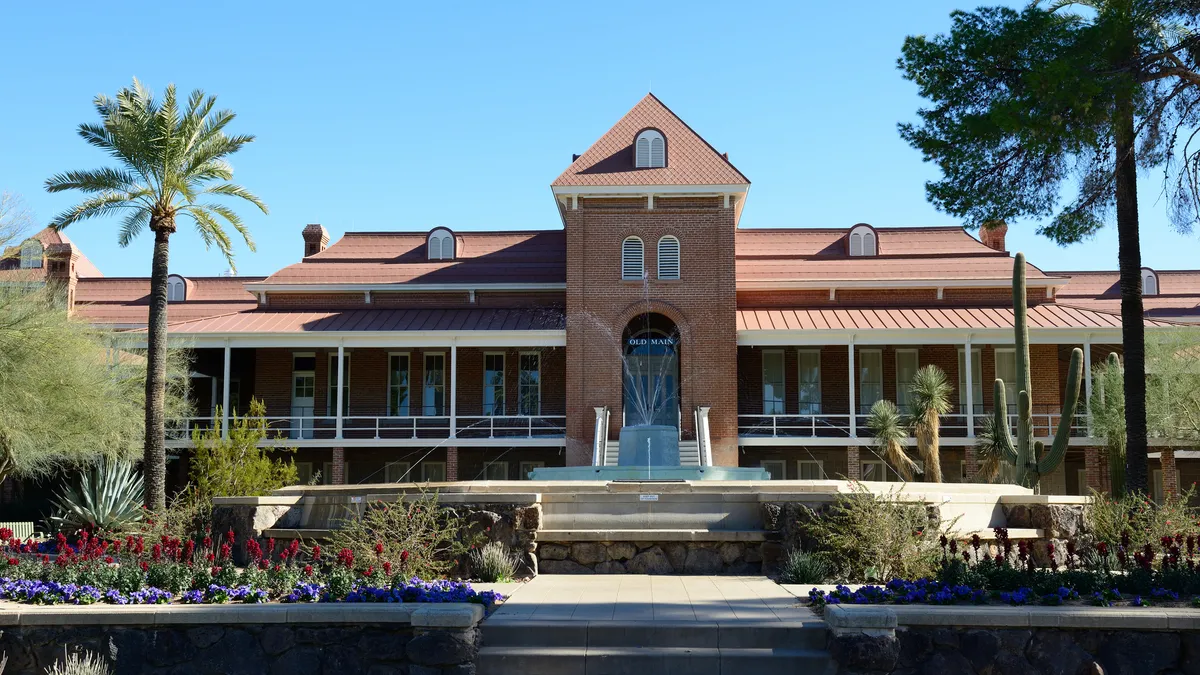Dive Brief:
- The University of Arizona is seeking to change accreditors in a move officials say will help the public institution better serve students as it integrates with the University of Arizona Global Campus, an online institution it acquired in late 2020.
- The Higher Learning Commission has accredited the University of Arizona since 1917. But the public university said it began considering “all options for institutional accreditation” after it announced earlier this year that it was taking steps to further integrate with UAGC, according to an FAQ about the switch.
- UAGC has been accredited by the Western Association of Schools and Colleges Senior College and University Commission, or WSCUC, since 2013, when it was known as Ashford University and operated as a for-profit under a different owner. University of Arizona said it will benefit from switching to WSCUC because of the agency’s guidance and high standards.
Dive Insight:
WSCUC has historically accredited colleges in California, Hawaii and American territories in the Pacific. It counts all of California’s public universities as members, as well as many of its private institutions, including the University of Southern California and the California Institute of Technology.
Previous regulations from the U.S. Department of Education barred regional accreditors like WSCUC from recruiting members that were outside of their historical boundaries. But changes to the rules in 2019 lifted that ban.
Critics of this change argued it would reduce the quality of accreditation because colleges would seek to switch to accreditors with lax oversight. That, in turn, would have major implications for higher education, as the Education Department relies on accreditors to be gatekeepers for billions of dollars in federal financial aid.
Shortly after the regulations changed, WSCUC became one of the first accreditors to announce that it would accept accreditation applications from institutions outside of its previous market. University of Arizona’s decision to switch to WSCUC marks one of the most high-profile accreditation switches since the new regulations took effect.
Since WSCUC’s announcement, a variety of other institutions have inquired or begun the accreditation process, Jamienne Studley, the agency’s president, said in an email.
In the FAQ, officials addressed concerns about whether the college was attempting to evade oversight.
“UArizona is not seeking to lessen oversight or rigor,” it said. “UArizona is seeking this change because the WSCUC mission and approach to supporting the institutions it accredits are closely aligned with UArizona's mission.”
The Education Department approved the University of Arizona’s request to switch to WSCUC on Nov. 14, according to the FAQ. The university has since submitted its application for accreditation with WSCUC and expects it will be reviewed by the agency’s officials during a meeting in late February.
WSCUC must also approve University of Arizona’s move to integrate with UAGC.
The University of Arizona’s foundation became the owner of a nonprofit corporation to hold UAGC in 2020, an initial arrangement that had the universities operating as separate but affiliated institutions. About a year later, the University of Arizona announced plans to integrate the two colleges.
If two colleges combine, the single institution would have one accreditation, said Studley.
Working groups composed of both of the institutions’ employees will address the challenges of combining their operations, according to the FAQ.
University of Arizona’s switch isn’t the first shakeup to the accreditation world. Earlier this year, Florida’s Legislature passed a law requiring the state’s public colleges to switch accreditors every cycle.
Clashes could follow. The Education Department announced this summer that colleges must obtain the agency’s approval before they switch accreditors or they could lose their access to federal financial aid. The policy is in part meant to ensure colleges aren’t switching agencies to evade oversight.
The University of Arizona and the Higher Learning Commission did not immediately provide comment Thursday afternoon.











